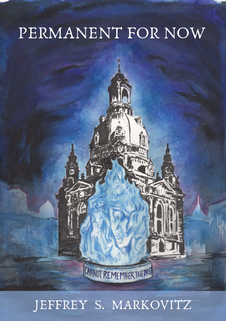The first chapter of Jeffery S. Markovitz’s new novel contains just two words: He died. This short statement is startling, but not altogether surprising for a story that centers around the events of World War II-era Germany, when death came for millions. In two short words, Markovitz not only sets the tone for the rest of the novel, but also lays the groundwork for a well-crafted twist at the end. The words reverberate as we are introduced to each new character, wondering, Is it him? Is he the one who died? The starkness and sense of dread from this first chapter is repeated throughout the book, contrasting beautifully with the intricately rendered characters that drive the story. With a shifting point of view, we focus in on certain elements of the story just long enough to become entranced, only to be forced to pan back out and reassess our perspective in the very next chapter. Seeing the story from various distances and though changing eyes adds both to the scale and depth of the novel, compelling the audience to continue reading, if only to find out who makes it out alive. Alternating between the story of young Mirko and his family, a pair of unlikely friends in a concentration camp, and the Old Man burdened with a terrible secret, this book is absorbing from start to finish.
In many ways, the characters in this story are defined and mirrored in their mobility—in their potential for change and movement, whether in running through the streets, facing an electric fence, going on a road trip, or just being able to get out of bed in the morning. This theme of movement and change is reflected in the age of the characters, as well, from young Mirko who “had the speed of tiny things,” to the Old Man who must plan all his movements with deliberate care. With graceful and foreboding descriptions, Markovitz shows his skill at creating believable characters, regardless of their age. When trying to capture the essence and vitality of youth, he writes of one child, “His little body was a wick; his purpose was to burn.” The precise and poignant language makes even the darkest part of this story pleasurable to read. It is not easy to decide whether this book should be tackled all at once or in small bites. There is a rhythm to the pace of the novel that makes it a quick read, but the difficult questions presented in the story almost demand a pause. As the audience is left to grapple with issues of death, the nature of remembering, and what survival is worth, Markovitz charges onward, as relentless as the march of time. A story spanning the globe and time, “Permanent for Now” explores what it means to change, to survive, and to atone. Despite the bleak undertones of the title, suggesting that even the things that we rely on most are merely temporary, after finishing the story there is the sense of comfort in knowing that nothing in this world, not even the bad, can last forever.
1 Comment
|
Archives
July 2024
Categories
All
|
|
Glassworks is a publication of Rowan University's Master of Arts in Writing 260 Victoria Street • Glassboro, New Jersey 08028 [email protected] |
All Content on this Site (c) 2024 Glassworks
|


 RSS Feed
RSS Feed
